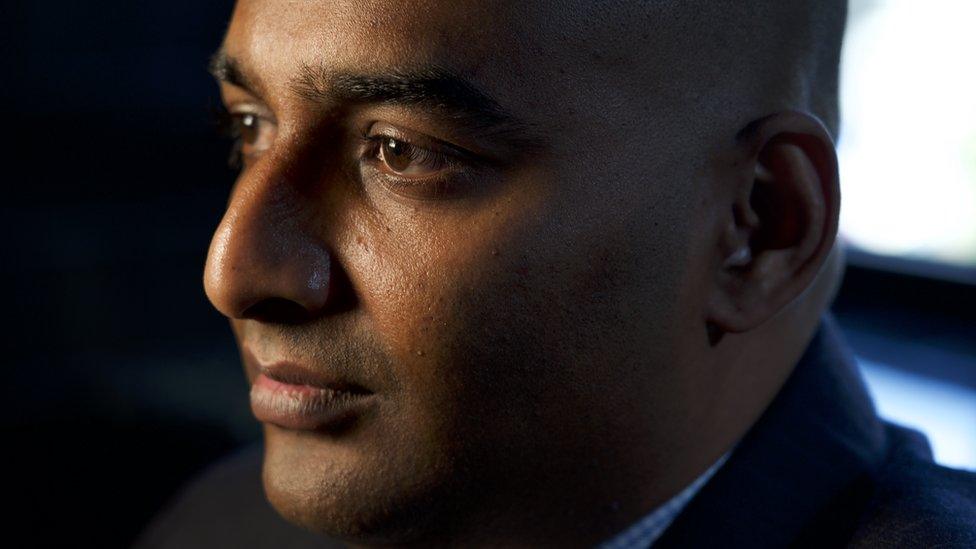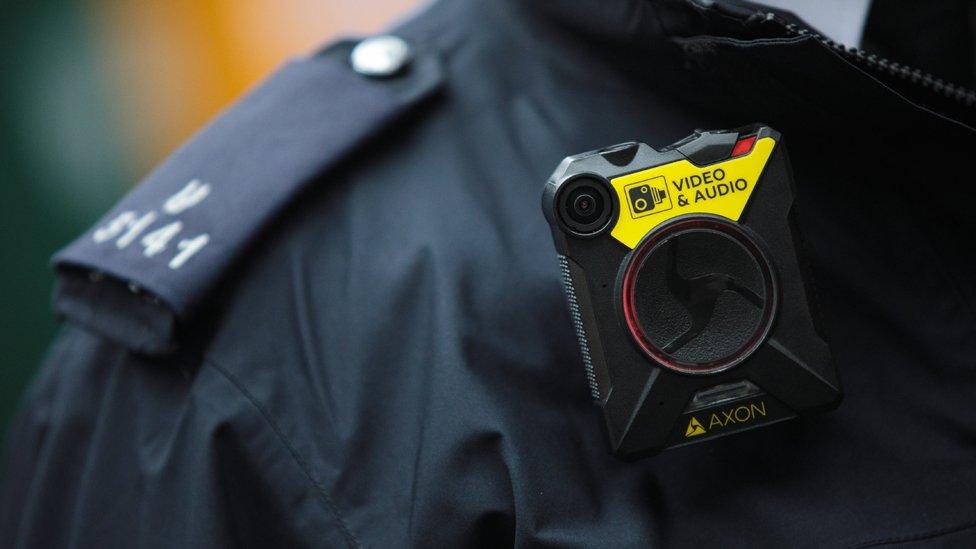Met officers under investigation allowed on patrol, whistleblower claims
- Published

Jaysen Veeren worked in the Met's Serious Misconduct Investigation Unit
Met Police officers facing allegations of assault and harassment were allowed on patrol because of staff shortages, BBC News has been told.
A former internal investigations officer claims he was told the force did not have enough staff and restrictions needed to be eased.
He also said he witnessed interference in investigations during his work in 2017.
The Met said changes in restrictions are "carefully considered".
Jaysen Veeren, who revealed the claims, worked in the Serious Misconduct Investigation Unit within the Directorate of Professional Standards (DPS), which is responsible for investigating the force's own officers and recommending actions such as a suspensions or restricted duties.
During his 18 months in the department, he claims:
He recorded a senior officer in the DPS saying the use of restrictions on officers under investigation needed to be "optimised" because the force did not have "enough" staff
An officer on a non-molestation order who was then alleged to have sexually harassed a woman in a shop, was allowed to go on patrol if he wore a body-worn camera
He was asked to justify an investigation into an officer who was alleged to have had relationships with multiple victims of sexual assault
Mr Veeren says senior officers who were brought into the DPS in 2017 wanted to change the use of restrictions on officers under investigation.
In September, he secretly recorded a meeting with an officer responsible for making decisions on misconduct investigations, known as the 'appropriate authority'. BBC News has listened to it.
At the meeting, the officer explained a change in "ethos" within the department.
"We haven't got enough people," he said. "We've now moved away from sacking everybody to only sacking people that we really need to sack."
He then referenced public comments by Met Commissioner Cressida Dick about shortages of officers within the force and said the use of restrictions needed to be addressed "as a direct result of that". He added the DPS was "jumping on to the restrictions far too quickly".
In June 2017, the Commissioner told BBC News the force was "stretched" and "need[ed] the resources to do the job". It's estimated the force lost more than 1,700 frontline officers from 2010 to 2017.

Body-worn cameras are used to capture both video and audio evidence when officers are attending incidents
Decisions over what restrictions officers should face while under investigation were made by a deputy assistant commissioner within the department based on evidence provided by Mr Veeren and other officers.
But Mr Veeren said he felt it was "very clear" he was being directed to present evidence which would lead to reduced restrictions.
One PC, who was on bail for breaching a non-molestation order, faced an additional complaint of harassing a woman working in a shop, according to Mr Veeren.
He said despite these complaints and having previously broken restrictions relating to his duty, the officer was permitted to go on patrol as long as he wore a body-worn camera at all times.
A different officer faced a gross misconduct hearing over the alleged assault of a woman, Mr Veeren said.
He said following a change in his restrictions, the PC was involved in a police chase which led to a moped crashing at a time when officers had been directed not to conduct such pursuits following a rise in incidents. The officer was not wearing body worn video at the time nor trained to drive a police car in pursuit, according to Mr Veeren.
Senior officers also criticised cases even where they were not directly aware of the evidence, Mr Veeren claims.
He says a detective inspector had sexual relationships with multiple victims of rape or sexual assault who he had met through his work in Sapphire Command, a team specialising in rape and sexual offences cases at the time.
While gathering evidence, Mr Veeren says his case officers were told the investigation was a "witch hunt" by two senior officers. He says he was also asked to defend concerns by a detective chief inspector about whether the investigation was "justified or necessary" with the force "haemorrhaging talent".
'Culture of mistrust'
Shortly before leaving his department in late 2017, Mr Veeren complained to the police watchdog, the Independent Office for Police Conduct (IOPC), and was transferred to a different department.
In August this year, the watchdog told him it had made learning recommendations about how the Met could improve its internal investigations and said there were "broken systems" and "a culture of mistrust" in the unit.
But it said there was no evidence of corruption and in a number of cases where "it appeared senior officers were interfering in cases, they were in fact managing the quality or timeliness of the investigation".
BBC News has learned a second officer made allegations about the handling of cases in the DPS during an employment tribunal.
These allegations "support" some of Mr Veeren's claims and make further allegations of "corruption and discrimination" within the same unit, according to an IOPC document relating to Mr Veeren's complaint.
The IOPC said it has concluded an investigation into the officer alleged to have had relationships with sexual assault victims and found he has a case to answer for gross misconduct.
The Met declined to say whether any officers allowed to go on patrol wearing body worn video while facing allegations of misconduct had been accused of sexual offences or had subsequently been the subject of any complaints while on duty.
In a statement, the force said the IOPC investigation found allegations that members within the DPS had abused their position to affect ongoing investigations were either "not corroborated or disproven".
It said it was not willing to discuss the cases of individual officers but said allegations of misconduct are investigated robustly. It added that when considering the use of restrictions on an officer, "the integrity of our professional standards investigations will always take primacy over any other business need".
"At the centre of any investigation is the welfare and safety of those involved, including those who make allegations and the wider public," it said.
Labour's Shadow Home Secretary, Nick Thomas Symonds, said "these are incredibly serious accusations".
"We must also be clear that pressures on police forces are a direct result of 11 years of cutting frontline officer and police staff numbers by the Conservatives", he said.
A Home Office spokesperson said the use of restrictions is an operational matter for forces. It said it had hired over 11,000 extra officers to bring crime down.